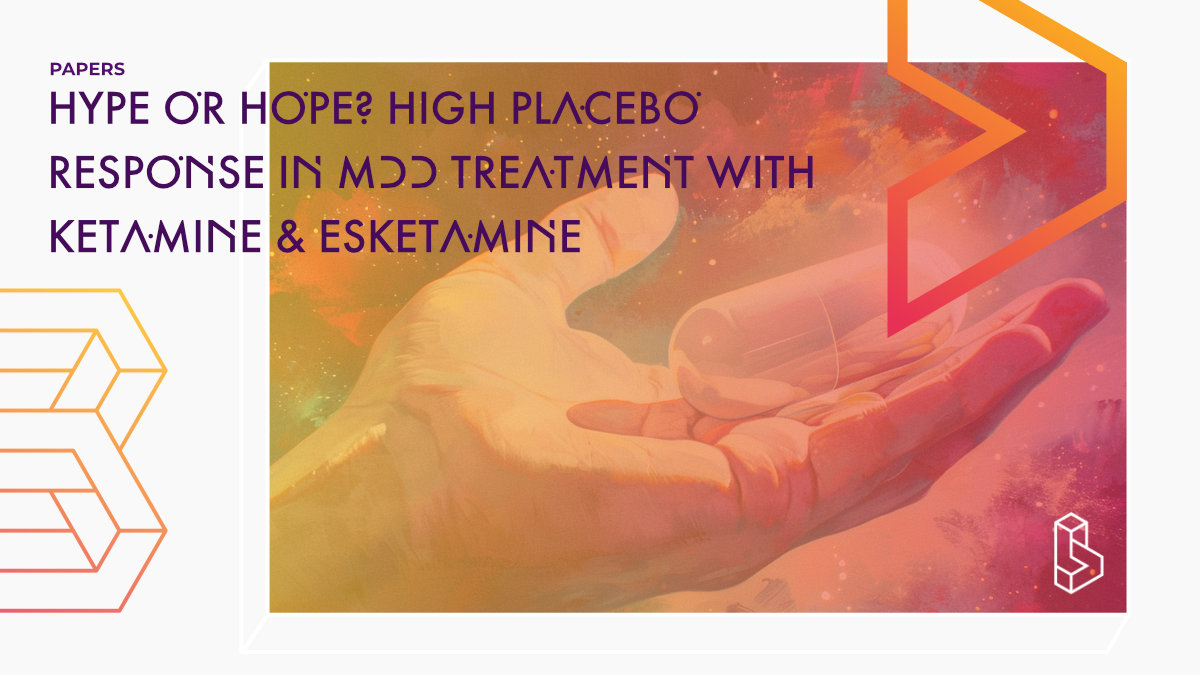This meta-analysis (n=1100; s=14) of clinical trials on patients with depression (MDD) receiving ketamine or esketamine reveals a substantial placebo response, accounting for up to 72% of the overall treatment response. The study emphasizes the importance of considering the placebo response in clinical practice to maximize the benefit to patients.
Abstract of Hype or hope? High placebo response in major depression treatment with ketamine and esketamine: a systematic review and meta-analysis
“Background: Ketamine and esketamine offer a novel approach in the pharmacological treatment of major depressive disorder (MDD). This meta-analysis aimed to investigate the placebo response in double-blind, randomized controlled studies (RCTs) on patients with MDD receiving ketamine or esketamine.
Methods: For this systematic review and meta-analysis Medline (PubMed), Cochrane Central Register of Controlled Trials (CENTRAL), PsycInfo and Embase databases were systematically searched for citations published up to March 17, 2023. A total number of 5017 abstracts was identified. Quality of the included trials was assessed with the Cochrane risk-of-bias tool. The meta-analysis was performed using a restricted maximum likelihood model. This study is registered with PROSPERO, number CRD42022377591.
Results: A total number of 14 studies and 1100 participants (593 in the medication group and 507 in the placebo group) meeting the inclusion criteria were selected. We estimated the pooled effect sizes of the overall placebo (d pl = -1.85 [CI 95%: -2.9 to -0.79] and overall treatment (dtr = -2.57; [CI 95% -3.36 to -1.78]) response. The overall placebo response accounts for up to 72% of the overall treatment response. Furthermore, we performed subgroup analysis of 8 studies for the for the 7 days post-intervention timepoint. Seven days post-intervention the placebo response (d pl 7d = -1.98 [CI 95%: -3.26 to -0.69]) accounts for 66% of the treatment response (d tr 7d = – 3.01 [CI 95%, -4.28 to -1.74]).
Conclusion: Ketamine and esketamine show large antidepressant effects. However, our findings suggest that the placebo response plays a significant role in the antidepressant response and should be used for the benefit of the patients in clinical practice.”
Authors: Alexandros Matsingos, Marcel Wilhelm, Laila Noor, Cüneyt Yildiz, Winfried Rief, Stefan G. Hofmann, Irina Falkenberg & Tilo Kircher
Summary of Hype or hope? High placebo response in major depression treatment with ketamine and esketamine: a systematic review and meta-analysis
Introduction
Placebo response is one of the mechanisms contributing to treatment response of antidepressant medication. Only about 15% of participants in double-blind RCTs may benefit from antidepressants beyond the placebo response.
Ketamine and esketamine are promising drugs for the treatment of major depressive disorder. However, concerns have been raised about the long-term efficacy, safety and tolerability of esketamine.
Find this paper
https://doi.org/10.3389/fpsyt.2024.1346697
Open Access | Google Scholar | Backup | 🕊
Cite this paper (APA)
Matsingos, A., Wilhelm, M., Yildiz, C., Rief, W., Falkenberg, I., & Kircher, T. (2024). Hype or hope? High placebo response in major depression treatment with ketamine and esketamine: a systematic review and meta-analysis. Frontiers in Psychiatry, 15, 1346697.
Study details
Compounds studied
Ketamine
Placebo
Topics studied
Depression
Study characteristics
Meta-Analysis
Participants
1100
Humans

